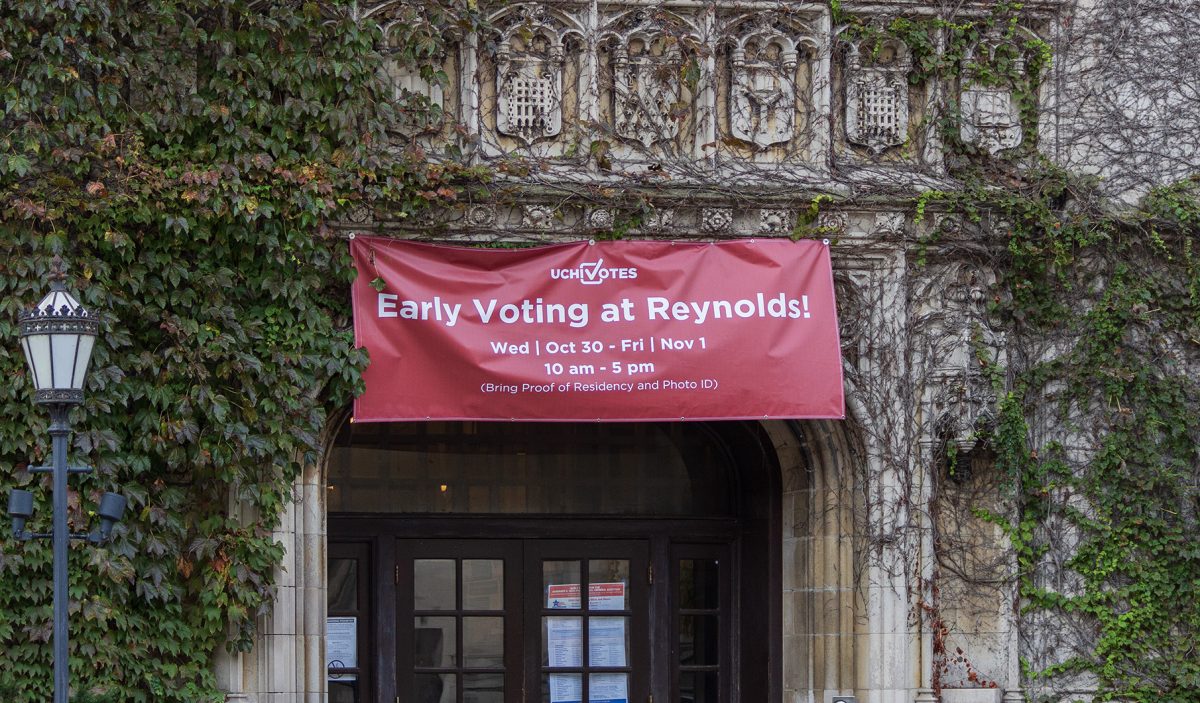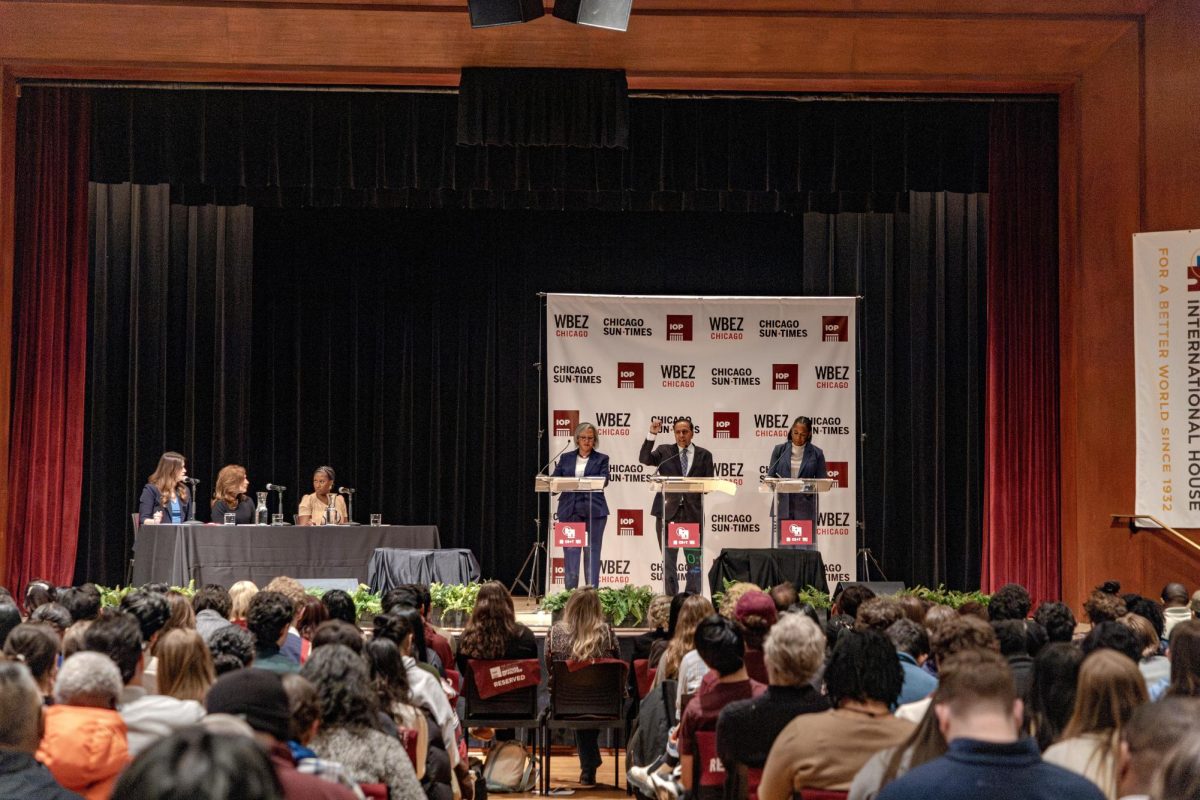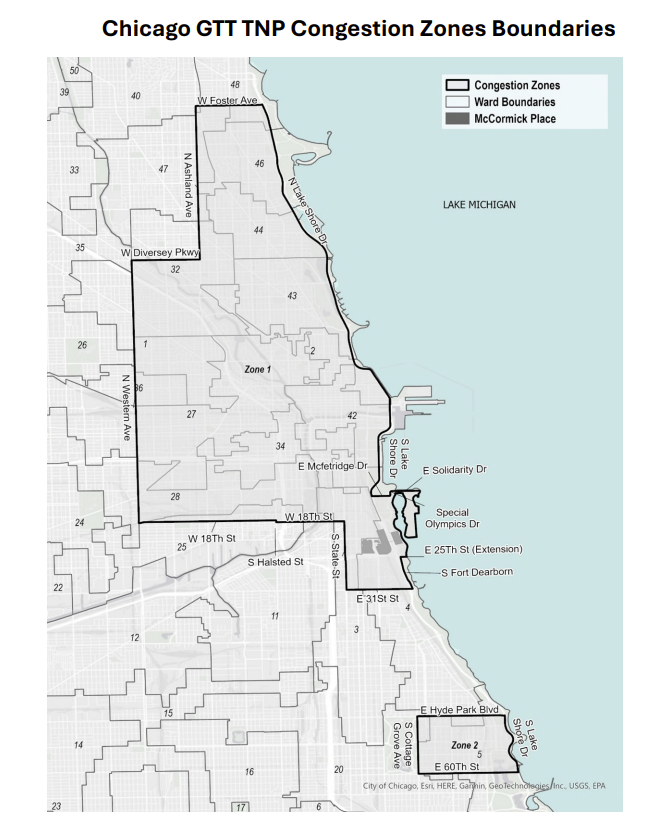“I’m fucking anxious, man,” said Spencer O’Brien, a fourth-year in the College. He had just come out of Reynolds Club, where early voting was taking place from October 30 to November 1, after casting his ballot for Democratic presidential nominee Kamala Harris. He said he is worried about single-issue voters, including those who disliked Harris’s stance on the Israel–Hamas war, delivering a victory for Republican presidential nominee Donald Trump.
“[Single-issue voters] will say something crazy, like, ‘There’s this one thing that’s convincing me to vote for Trump’—I’m not a Trump fan—and that just sounds crazy to me. It’s like comparing breakfast cereal and Clorox,” he said.
With Election Day fast approaching, many other students who voted early share O’Brien’s deep sense of worry.
Elizabeth Prophet, a master’s student at the Crown Family School of Social Work, Policy, and Practice, said she is concerned about a repeat of Trump’s attempt to contest the 2020 election if Harris won this year. “I just saw a tweet right before I walked in [to vote] that Bernie Sanders is saying how Trump will probably declare his win on election night, regardless of what happens,” Prophet said. “[Trump] is gonna chip away at the integrity of the election, so I’m really worried.”
The line to vote early in Reynolds trailed out of the building and around the corner. Many students said they’d stood for hours in the cold to cast their vote out of a sense of commitment to democratic participation.
“I feel like it really is every American’s responsibility and job to get out there and participate in democracy,” said David Juarez, a third-year in the College who grew up in the South Side.
Many said they had not been familiar with local races before, but had done research the day they voted, while in line, or even in the voting booth.
“I did my research—took all morning—and then waited here all morning because I figured [the local elections are] where it matters to vote,” O’Brien said.
Prophet said that while she was waiting to vote, “I actually picked up a South Side Chicago newspaper in line and read about the school board election candidates.”
Injustice Watch, a Chicago-based nonprofit newsroom, was a resource many used to decide how to vote on judicial races. Endorsements from the Chicago Teachers Union (CTU), while receiving a more mixed reception from students, were also a big factor they considered in voting in Chicago’s first-ever school board races.
O’Brien said he voted according to the CTU’s endorsements. “I just want someone who’s experienced with the school system,” he said. “My mom’s a teacher. She doesn’t teach in the public school system anymore, but that’s important to her.”
On the other side, fourth-year in the College Gabe Kertesz said he is “skeptical” of the union and its endorsements.
“Not shockingly, they use their power and the weight of how many people are in the Chicago Teachers Union to lobby for themselves, to get better pay and for more jobs for teachers,” Kertesz said. “But on a system scale, consistently going with exactly what the teachers want can be bad for the school system overall… I think it’s important that the school systems do a good job of educating the young people of the city, and right now they’re not doing that.”
Voters also differed on whether they voted for only one party or split their votes among candidates from multiple different parties, a practice called splitting a ballot.
Prophet said she didn’t split her ballot. “I chose to vote ‘no’ on retaining judges, but that’s more of a protest vote that I don’t think any judge should have a long term in office.”
Kertesz did split his ballot. “I vote mostly Democrat, but there were a few positions where I didn’t just straight vote for the Democrat [in partisan races],” he said. “If you have a big corruption case hanging over your head, or some giant scandal that was reported on and looks pretty bad, I’m probably not going to vote for you.”
O’Brien said he voted for one Green Party candidate for the Metropolitan Water Reclamation District race.
“I voted Democratic, and then that one Green Party name, because I like the Green Party. If [the party] was a bigger deal, I’d go Green [for more races, but] you vote where it matters,” O’Brien said.
Despite the anxiety and the line, Kertesz said he was glad to see so many people coming out to vote.
“I’m encouraged, because I think even the people I talk to who vote for different candidates than me, they have their reasons, and they want what’s best, and I want what’s best. And our versions of best might be really different, but I’ve been mostly encouraged by the people I talk to,” Kertesz said.
The Maroon also spoke to Ellie Stieger, voting ambassador co-director at UChiVotes, who spoke about the importance of increasing voter turnout and accessibility among college students.
“College students are one of the lowest-voting demographics, and we really want to change that,” Stieger said. “The most common barriers [to voting] there are not knowing the dates or information that comes along with voting, so we kind of want to show College students that voting is a lot easier than you think it is, and we should all be doing it.”
Stieger shared information about how students planning to vote should prepare.
“Any UChicago student is able to vote in Chicago. All you will need is proof of residence, which, if you live in the dorms, will be on your housing portal, or, if you live off campus, would just be a copy of your lease,” Stieger said. “You’ll need a photo ID—whatever gets you through TSA—or your student ID, and you’ll just need to know the last four digits of your social [security number].”
Stieger added that on Election Day, UChiVotes will walk people to Hyde Park polling locations and be at Reynolds Club to answer questions.















